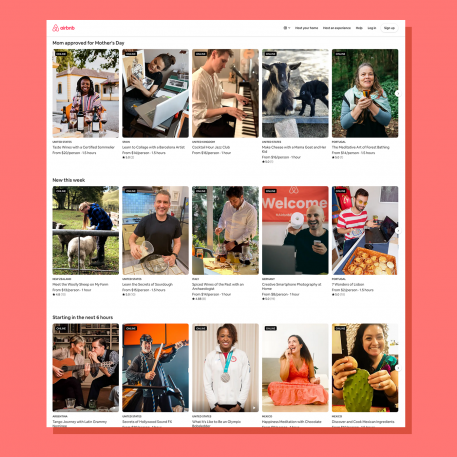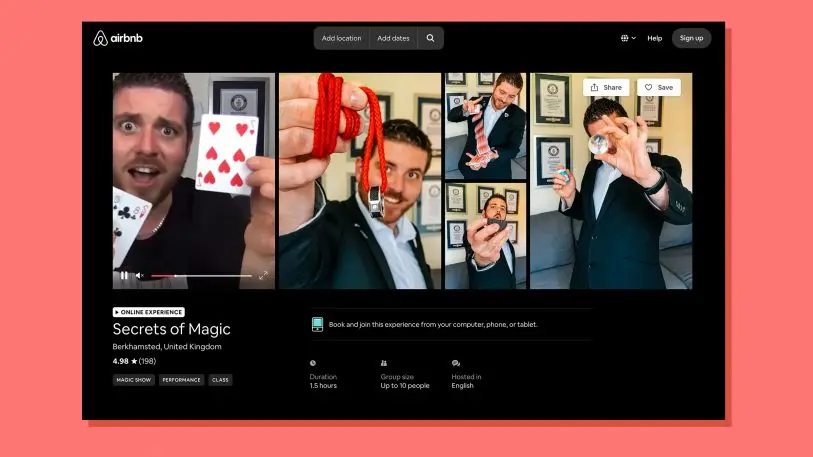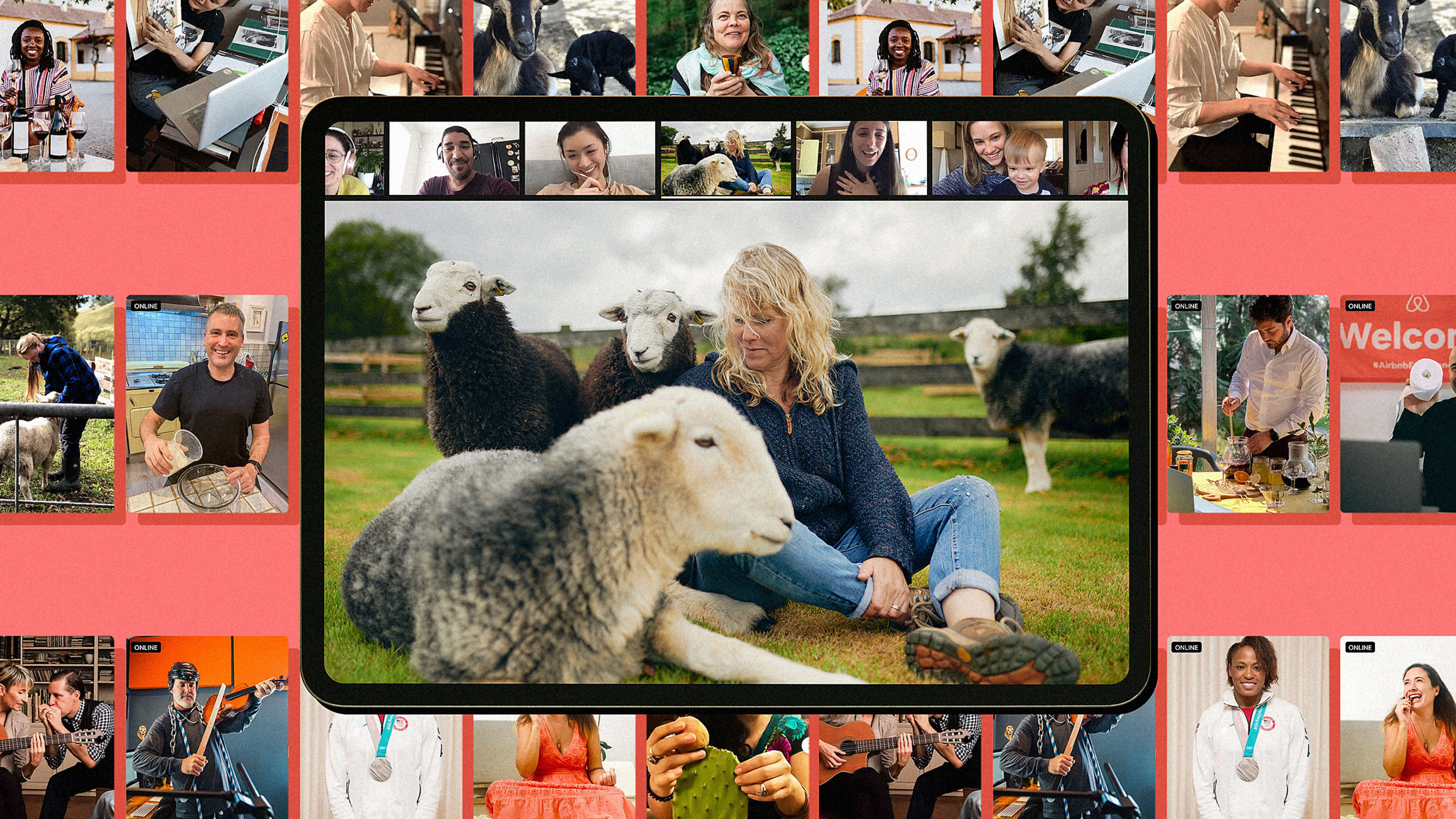It’s Wednesday morning on the who-knows-what day of quarantine, and I’m at a magic show. Well, more accurately, I’m at a magic class, a fact that is made readily apparent when I’m snapped back to attention by my instructor:
“Mark, do you have your toilet paper roll?”
“Yes,” I nod, as I hold my Charmin up to my webcam for everyone to see. I’m a bit self-conscious for the faux pas, until one of my classmates, a 6-year-old I’ll call Maria, makes an announcement.
“I just fell off the couch!”
I’ve spent $19.03 to attend an Airbnb Online Experience, hosted on the world’s favorite video-chat platform, Zoom. Since 2016, Airbnb has offered “Experiences,” in which service providers Airbnb calls “hosts” act as local tour guides, giving you the insider’s view of a city’s music, food, shopping, or history.
Experiences are just a fraction of Airbnb’s revenue, which were reported to exceed $1 billion quarterly pre-crisis. But in the wake of COVID-19, as much of the world is in quarantine instead of traveling, Airbnb’s revenue is in a nosedive. The company has predicted a 54% drop in revenue, to $2.2 billion, this year. It’s offered $250 million in credits to keep its hosts afloat amid months of canceled reservations (which is a significant chunk of its tenuous $3 billion cash pile), though many hosts have complained those payments are scant. And along the way, COVID-19 has shaved $5 billion off of Airbnb’s $31 billion private valuation, to $26 billion.
If nothing else, COVID-19 has demonstrated the vulnerability of the shared economy wunderkinds, such as Airbnb, Uber, and Lyft, which have posted incredible revenue by leveraging the assets of some people and connecting them to meet the needs of other people. But when demand wanes, these companies have little of value to fall back on. Put differently, Airbnb has built a multibillion-dollar company by renting out 6 million properties without owning, maintaining, or paying insurance on them. And that was the business model of the century, until it wasn’t.
Airbnb goes virtual
On March 17, Airbnb set up listening sessions with its hosts around the globe, many of whom were worried about how they could make a living when their Airbnb payments dried up. And what resulted, just three weeks later, was Online Experiences. For prices starting at $5 an hour, you can hop into a Zoom meeting with a small group of other people to do Zumba with an Olympian, drink sangria with a drag queen, or even—and I sort of hate that I didn’t try this one—meet a real life shark scientist.
In many ways, Online Experiences seem like the natural evolution of Airbnb. Why not boost the scale of the platform by moving all these classes and events online? But Catherine Powell, Airbnb’s head of Experiences, contends that the choice to put Experiences online was never in the company’s trajectory, and was instead the direct result of so many out-of-work hosts asking exactly for this option to make money while quarantined.
“Now you could say, ‘Well you could have done that anyway,’ [but] it wasn’t an obvious move for us,” says Powell. “Because we want to protect what we believe to be core to our Experiences: human connection.”

To put hosts on video, Airbnb took practical steps: It set up Zoom accounts for hosts and offered tips for lighting and filming. But it also worked with 50 handpicked hosts—mostly people who had been successful hosting a wide variety of in-person experiences, though also talent sourced from partnerships with the Olympics and Cirque du Soleil—to figure out the best ways to translate experiences from in person to online. This ensured that Airbnb Online Experiences are a differentiated product from all the other social video platforms.
“We’ve encouraged them not to go to YouTube for inspiration,” says Powell. “We’ve had hosts who wanted [to run] a ‘watch my cat online’ experience, when they know that wouldn’t be a distinctly Airbnb Experience.”
If Airbnb Online Experiences feel more like events than just something else to watch online, then Powell believes the company can carve out a unique value proposition to not just supplant your next FaceTime chat with family, but break into the crowded video entertainment market.
“I would say that our competition isn’t the other Zoom experiences, it is Netflix and other ways people might think, ‘How do I want to spend my time tonight?'” says Powell, pointing out that most Online Experiences are booked within 24 hours. In this sense, Online Experiences are built on the tacit assumption that we’re all going to have Zoom fatigue from these aimless happy hours and video chats. And that much like we go on dates in real life to have a shared experience other than just talking, we will do the same online.
“What we’re doing is so different,” says Powell. “One example, a friend of mine, she and her book club did a twerking experience together.”
The experience is better than you might expect
Back in my twerk-free magic class, my host Martin Rees offers an escape from the world of COVID-19. “For the next hour, we’re going to completely forget what’s happening outside,” he says. Then, speaking with a rapid-fire English accent between sips of Coke and intrusions by his cat, he starts by taking attendance. We’re an eclectic mix of people spanning from about age 6 to 60, hailing from the U.S., Montreal, and Dubai. Seven of us attend in all. The enthusiastic children are a real treat, and I wish I’d brought my own to the class—though I also find myself wondering if I’d be so thrilled at the all-ages group if I’d set this up as a friends outing or date-night option, as Airbnb suggests Online Experiences might be?
Then Rees eases us into the class with a bit of close-up sleight of hand. He apologizes for the moments when he mutes us, but as he explains while doing so, Zoom cutting to a gasping audience reaction can really ruin the reveal of a good trick. “I’d get to the magic moment, they make a noise, it cuts to them,” he says, “and all you see is them saying, ‘Oh my god, this is amazing!'”
Rees makes coins disappear and cards change colors, and I’m admittedly surprised how well the illusions translate. Rees is clearly following a curriculum as he segues effortlessly between tricks, tutorials, and his personal story, but it is exactly this flow that makes his class feel like a class, and not just another endless group meeting with coworkers or friends. After the first 15 minutes, I stop watching the clock and find myself surprised when the 90 minutes are done.

What can I say, I enjoy magic! I had a good time! I laughed! I learned! And by 9:30 in the morning, I return to my kids, triumphantly holding that toilet paper roll, ready to show them a few tricks I’d mastered. I’ve been fielding requests to pull quarters from their ears ever since. Was it worth $19? For sure.
I’m left with the conclusion that the format works, at least right now, for this captive audience stuck indoors during a quarantine. But can Online Experiences scale to become a meaningful part of Airbnb’s business long term—whenever we emerge from hiding and actually go out and do things again?
“All the data is unsubstantiated as of yet, but it’s so positive,” says Powell. “I can absolutely see a future in Online Experiences, and complementing the real life [Experiences].”
When we last spoke, Airbnb had nearly 100 Online Experiences and was eyeing thousands more to bring onto the platform. But even if Online Experiences revenue isn’t that great compared to Airbnb’s core business—and no one at Airbnb suggested to me that it would be—Powell believes it could offer off-season stability for many Airbnb hosts who take a hit whenever tourism ebbs in their city. And for the top hosts, it’s a meaningful income. Sangria and Secrets with Drag Queens made $17,341 the week after launch, a tour through Chernobyl earned $10,626, and a wine-tasting and pasta-making class each clocked in more than $6,000.
“The fact that we’re a global platform with so many Experiences across the continents . . . means people are able to have a taste of global culture without traveling,” says Powell. “Even when travel rebounds, people can’t travel all the time. And Chernobyl might not be on your travel list!”
Recognize your brand’s excellence by applying to this year’s Brands That Matter Awards before the early-rate deadline, May 3.
